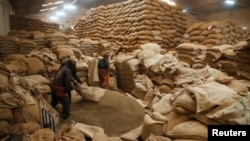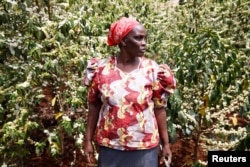When Nestle executive Stephan Canz attended the German school in Nairobi in the early 1980s, it was surrounded by lush coffee farms.
Today, the trees have long since been uprooted and replaced by a shopping mall and upmarket homes, driving a sharp drop in
production of Kenya's premium beans.
"The coffee has disappeared," said Canz, who co-manages Swiss-based Nestle's partnerships with coffee farmers globally. "You have to go almost to the slopes of Mount Kenya to find coffee."
Kenya accounts for just 1 percent of the global crop, but its high-quality arabica beans are sought-after for blending with other varieties.
Alarmed by a steep drop in the country's production, Nestle, which buys 10 percent of the world's coffee and has the leading packaged coffee business, is working with farmers to guarantee its supplies.
In a $1 million project, begun in 2010, it says it is boosting bean production and quality.
Mary Wanja, with 350 coffee trees on her plot in rural Kirinyaga at the foot of Mount Kenya, is one of more than 40,000 of Kenya's 600,000 coffee farmers participating in the project.
She harvested 1,200 kg of coffee last year, double the previous year, and saw her annual earnings rise to 100 shillings ($0.99) per kg, from 70 shillings.
"We are planting more trees so we can harvest more," she said, standing amid newly planted seedlings provided by the Nestle project, which she joined three years ago.
Multiplier effect
Since Kenya's production peaked at 129,000 tonnes in 1988/89 it has dropped steadily due to poor management and global price swings. Farmers have switched crops or sold their land.
Nestle, which is counting on growth in its coffee business as it overhauls its business to improve performance, works with a local milling and marketing company, Coffee Management Services (CMS), to train farmers regularly on fertilizer application, pest and disease control. It provides seedlings for farmers wishing to plant more.
"People didn't know how and when to apply fertilizer properly. Nestle has taught us a lot," said William Njeru, a farmer who harvested 7,600 kg last year, up from around 1,200 kg a year before he joined the project five years ago.
"If we can have other partners who are doing what Nestle is doing, the multiplier effect on productivity in Kenya can be very high," said Peter Kimata, deputy head of Nestle's partner CMS.
A half hour drive up the road from his office sits an abandoned coffee factory with rusting machinery.
Farmer Moses Wachira says it was closed in 2013 after its management embezzled farmers' money. That forced 500 farmers to start selling their coffee to brokers who offer lower prices.
"These problems are causing production to fall because nobody watches to ensure managers do not misappropriate farmers' money," said the white-bearded farmer.
Kenya's harvest fell 12 percent in the 2016/17 season to 40,700 metric tonnes, according to government data.
Government efforts to revive the sector have faltered. Last year, a judge stopped the government from acting on the recommendations of an official report on ways to boost coffee production after farmers claimed they were not consulted.
Some Kenyan farmers will miss out on expanding the crop to meet 2-3 percent annual growth in global demand for coffee, according to Nestle, as consumers discover new ways of consuming coffee, including capsules and cold brews.
Demand for coffee is also growing locally.
In Kenya, cafe chain Java, owned by Dubai-based private equity firm Abraaj, opened its first shop in 1999 and has grown to 68 retail outlets, as an emerging middle class and young professionals develop a taste for lattes and mocha.
"The coffee has to come from somewhere," said Canz.






